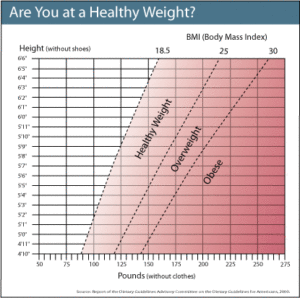As we embark on bathing suit season, we all revisit weight loss goals that were set up at the beginning of the year (Remember that New Year’s resolution?). Although there is much information available online about optimal weight for good health, there is also a lot of inaccurate information, a lot of fad diets, and some bad advice. Let’s separate fact from fiction, according to the rigors of scientific studies.
BMI or Bust
You may wonder what the difference is between being a little overweight and obese. One determinant is based on the Body Mass Index (BMI) model, a tool to help doctors and patients assess optimal and suboptimal weight. It takes into consideration height and weight, sometimes age and gender. A BMI score of 18.5 to 25 is considered in the healthy weight range. Having a BMI score over 25 indicates that a person is overweight. If the BMI is 30 or higher, the person is considered to be obese.

BMI is one tool to assess a level of health but it isn’t perfect because it doesn’t take it account the differences in body mass due to fat versus muscle, which may misclassify people with larger body types as overweight or obese. But it is one factor to keep in mind when working with your physician on an overall health assessment.
Losing Weight, Gaining Health
I’ll be the first one to say that I do not care for the word “diet.” Dieting is often used as a short term plan rather than a long-term lifestyle solution. What most of us need is a lifestyle overhaul, not a part-time diet. Modifying habits is key. Some people have tried fasting on alternate days but the weight loss benefits don’t hold up scientifically. Here’s why. There is a difference between a weight loss phase and weight loss maintenance. The first part is thrilling. You see the pounds come off through changes in diet and exercise, but unless you are able to keep up with the change, you are likely to slide back into unhealthy habits. Your best bet is the way of the tortoise, slow and steady. Losing a pound or two a week should be considered success. Some of this weight loss is water weight and some is fat loss. You should add strength training with weights to keep your bones strong, which is critical around age 40 and up. Being overweight can have an adverse effect on sexual and reproductive health—all the more reason to aim for optimal weight.
Genes do not Determine Fate
For some, being overweight is not only related to food and beverage intake, but the genes we are born with. But the good news is this—physical activity through exercise can offset those pesky genes and help get you back into your favorite pair of jeans. In a meta-analyses of results from 60 studies, including up to 180,423 adults, physical activity was shown to modify the genetic effects that give rise to increased risk of obesity. This is an exciting revelation for people who may feel as though they can’t break the cycle of obesity. It’s multifactorial– genes are just a part of that. Charting a food and exercise journal, or downloading an app for easy tracking may help you keep the healthy habits for the long term.
Fall in Love with Water
In a work-fueled week, it may be easy to sip on an afternoon soda for energy, or wind down with a glass of your favorite Pinot Noir at happy hour, but an interesting study shows that for every swap for water, there are long-term benefits. This study found that replacing one sugar-sweetened soda (but not other sugared drinks, like fruit juices) or beer with one serving of water per day at baseline was related to a lower incidence of obesity and to a higher weight loss over a four-year period. Does that mean to switch to diet soda? Well, not so fast! Although diet soda doesn’t have the same calorie impact, the alphabet soup of ingredients to make it sugar-free is not healthy either. The bottom line: try swapping one drink for water per day.
Nix Depression
Kids who are overweight in their young lives may suffer symptoms of depression later in life. Just like genes, your childhood does not have to determine your adulthood. Your level of activity can mitigate these symptoms. Physical activity has been proven again and again to have a beneficial effect on depressive feelings, by using one’s own body chemistry, endorphins, to fuel our pain relief, and mitigate sad feelings, may also have an effect on weight. Does that mean you need to run a marathon? No. The critical factor is frequency of exercise rather than duration or intensity. Get in that after dinner walk, swim when possible, and have fun with a friend!
We Can Help
We are a multifaceted office of medical professionals with an emphasis on women’s health that can help you meet your weight loss goals prior to and during menopause, a time when the pounds can seem to come out of nowhere and the waist starts to spread.
Call us at 1-202-293-1000 for an appointment today and learn your options.
